Archive of Lost Calendars
A downloadable story
Archive of Lost Calendars.
Chapter 1 - The Day That Refused to End
A Solo Story from the Archive of Lost Calendars
It began with a shower.
Not a dramatic one. Not the kind that cleanses or renews. Just water falling from a ceiling, indifferent to the body beneath it. The cat stood there, soaked, unmoving. His fur clung to his bones like wet paper. His eyes were open, but not seeing. He was not sad. He was not angry. He was simply tired.
Tired in a way that made the days blur. Tired in a way that made the names of the week irrelevant. Monday, Tuesday, Saturday, Sunday — they were all the same now. Just syllables floating in a fog of repetition. The cat had stopped counting. He had stopped naming. He had stopped hoping that tomorrow would be different.
He lived in a small apartment with no clocks. Not because he hated time, but because time had stopped visiting. The calendar on the wall was blank. Not crossed out. Not torn. Just blank. A white void where days used to live. He had tried to fill it once — with stickers, with drawings, with invented holidays. But the calendar rejected them. It remained blank, as if to say: “There is no day today.”
So the cat created his own rituals.
Every morning, he would wake up and whisper a word that didn’t exist. “Flarn.” “Zindle.” “Mour.” These were his new days. He didn’t know what they meant, but they felt real. He would write them on scraps of paper and hide them under the couch. He imagined that someday, someone would find them and understand.
He had a box of cards. Not playing cards. Not tarot. Just cards he had made himself. Each one had a feeling. “Exhaustion.” “Weight.” “Fog.” “Static.” He would draw three each morning and let them decide his mood. If he drew “Fog,” he would speak only in whispers. If he drew “Weight,” he would wear his heaviest coat, even in summer. If he drew “Static,” he would turn on the radio and listen to the noise between stations.
One day, he drew a card he didn’t recognize.
It said: “The Day That Refused to End.”
He stared at it for a long time. It had no drawing. No color. Just the words, written in shaky ink. He didn’t remember making it. He didn’t remember dreaming it. But it felt familiar. Like something he had always known.
That day, everything slowed.
The shower lasted hours. The water never ran cold. The light outside the window stayed the same — not morning, not afternoon, not dusk. Just light. He walked to the kitchen and found the fridge humming a song he had never heard. He opened it and found a single apple, glowing faintly. He didn’t eat it. He placed it on the table and stared at it. It pulsed like a heart.
He tried to sleep, but the bed rejected him. It felt too awake. He tried to read, but the words rearranged themselves. He tried to cry, but the tears stayed inside, like guests refusing to leave.
So he sat.
He sat in the middle of the room, surrounded by his cards, his invented days, his pulsing apple. He whispered to the air: “Is this still today?” The air didn’t answer. It just held him, gently, like a blanket made of silence.
Hours passed. Or maybe none did.
He stood up and walked to the mirror. His reflection blinked before he did. It looked tired, but not broken. It looked like someone who had survived something invisible. He touched the glass and said: “I name this day.” The mirror didn’t respond, but it didn’t resist either.
He wrote the name on the wall:
“The Day That Refused to End.”
And then, finally, it did.
The light shifted. The apple dimmed. The cards stopped humming. The shower turned cold. The bed softened. The calendar, still blank, seemed to sigh.
The cat curled up on the floor and slept. Not because he was no longer tired, but because he had named the tiredness. He had given it shape. He had made it a story.
And stories, unlike days, always end.
Chapter 2: Mourday
A day invented by grief itself.
The room was full of objects that no longer existed.
A cracked teacup that had been thrown away years ago. A photograph burned in a ritual the character barely remembered. A coat that belonged to someone who had never lived. Each object sat quietly, waiting to be noticed. And when the character opened their eyes, they all began to speak.
“You forgot me,” said the teacup.
“You tried to erase me,” said the photograph.
“You wore me when you were someone else,” said the coat.
It was Mourday. A day that arrives unannounced, like a memory too heavy to carry. The sky outside had no color. The clocks ticked backwards. The cat wore a coat made of names — stitched from letters, syllables, fragments of people who had been loved and lost.
The character moved slowly, as if walking through syrup. Every step echoed with a name. Every breath tasted like absence. They tried to speak, but their voice came out as someone else’s.
They sat in the center of the room and began to write. Not a story. Not a letter. Just a list of things they had forgotten. The list grew long. It filled the walls. It spilled onto the floor. The cat curled up beside it, purring softly, as if to say: “It’s okay to forget.”
Mourday ends only when the character forgets their own name — and chooses a new one.
They wrote it on the wall.
They whispered it to the objects.
And the objects, one by one, disappeared.
Chapter 3: The Tuesday That Forgot Itself
A day that loops without knowing it’s looping.
Tuesday began with toast.
The character made it, buttered it, ate it. Then made it again. The same toast. The same plate. The same crumbs. They didn’t notice at first. The repetition was gentle, like a lullaby. But by the third breakfast, something felt wrong.
They greeted the same stranger twice.
They wrote a letter they had already sent.
They found a book on the shelf that was already open to the page they had just read.
The cat followed them from room to room, always slightly different. A missing ear. A longer tail. A new scar. The character asked, “Have we met?” and the cat blinked once, slowly.
The story unfolded in fragments. Sentences repeated. Paragraphs mirrored. Emotions echoed. The character began to feel like a copy of themselves — a version written over too many times.
They tried to break the loop. They screamed. They slept. They burned the toast. But Tuesday didn’t care. It kept forgetting itself. It kept starting over.
The Tuesday That Forgot Itself ends when the character stops asking what day it is — and starts naming the moments instead.
They called one “The breath before the toast.”
Another “The blink that felt like goodbye.”
And finally, “The scar that wasn’t mine.”
Chapter 4: The Day I Slept Through the Moon
A day that passed while the character slept — but left traces.
The moon came and went. The character missed it.
They had slept through the entire night, but not peacefully. Their dreams were filled with static, with whispers, with shadows that didn’t belong to them. When they woke, the room had changed.
The pillow was wet.
There was a drawing on the wall — a spiral made of stars.
The sink whispered a name they didn’t recognize.
The cat refused to speak. He just stared at the ceiling, where the moon used to be. His eyes glowed faintly, like twin moons that hadn’t left. The character followed his gaze and saw nothing. But they felt something. A pull. A presence. A memory that hadn’t been made yet.
They searched the apartment for clues. A spoon bent into a crescent. A note written in their own handwriting, but signed by someone else. A feather that pulsed with warmth.
The story is told through these objects. Each one reveals part of the night’s ritual. Each one asks a question the character cannot answer.
They must decide: chase the moon or let it go.
They choose silence.
They sit beside the cat.
They whisper, “Tell me what I missed.”
And the cat, finally, closes his eyes.
Chapter 5: The Calendar That Drew Itself
A day where the calendar begins to fight back.
The calendar was blank. It had always been blank.
But today, it wasn’t.
The character woke to find names written in ink they didn’t own. “Unspoken.” “Echoday.” “The Day of the Folded Spoon.” Each square filled itself in, slowly, like a wound healing in reverse.
They tried to erase the names. The calendar bled.
They tried to ignore them. The names grew louder.
They tried to leave. The door led back to the calendar.
The cat began to draw on the walls. Spirals. Eyes. Symbols that matched the calendar. The character watched in silence, unsure whether the cat was warning them or guiding them.
They opened the fridge and found a date written on an apple.
They turned on the radio and heard a countdown to a day that didn’t exist.
They looked in the mirror and saw a version of themselves already living tomorrow.
The Calendar That Drew Itself ends when the character stops resisting.
They pick up a pen.
They write a name on the next blank square: “Today.”
And the calendar, finally, sighs.
Chapter 6: The Day That Wasn’t Meant for You
A day that belongs to someone else — but you’re trapped inside it.
The character woke up in a house that wasn’t theirs.
The walls were painted in colors they hated. The books were written in a language they didn’t speak. The cat hissed when they tried to pet him. Nothing fit. Not the clothes. Not the memories. Not the silence.
They tried to leave. The door led to the same room.
They tried to speak. The voice wasn’t theirs.
They tried to remember. The memories belonged to someone else.
They found a journal. It was filled with entries they hadn’t written. Each one described a day they hadn’t lived. “Today I forgave myself.” “Today I buried the spoon.” “Today I named the cat.”
The character read the journal aloud. The house began to shift. The walls softened. The books translated themselves. The cat blinked twice, slowly.
The story ends when the character stops resisting.
They sit at the desk.
They write a letter to the person the day was meant for.
They sign it with a name they’ve never used.
And the house, finally, lets them go.
| Updated | 29 days ago |
| Status | Released |
| Category | Book |
| Author | Carlos Games |
| Tags | Comics, emotional-narrative, existential-fatigue, poetic-storytelling, quiet-fiction, ritual-fiction, solo-stories, story |
| Average session | A few seconds |
| Languages | English |
Download
Click download now to get access to the following files:
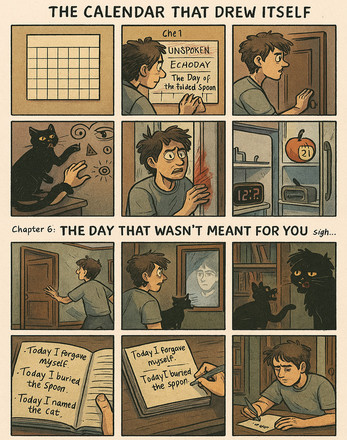
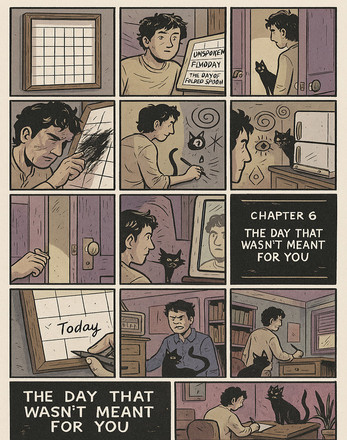
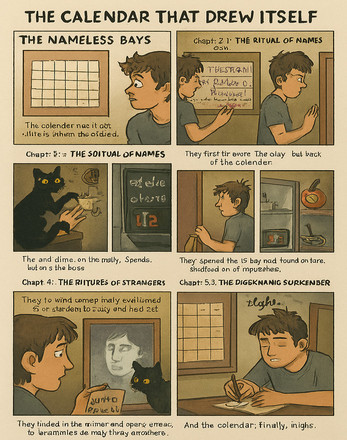
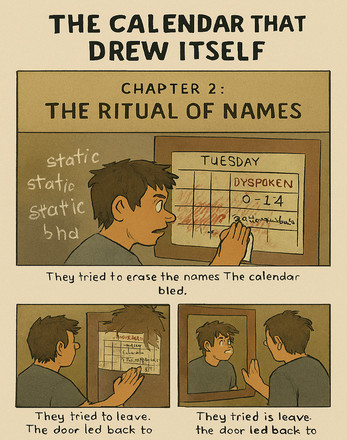
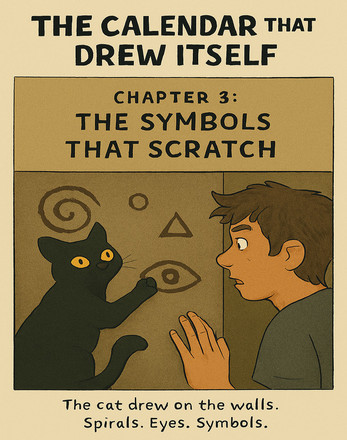
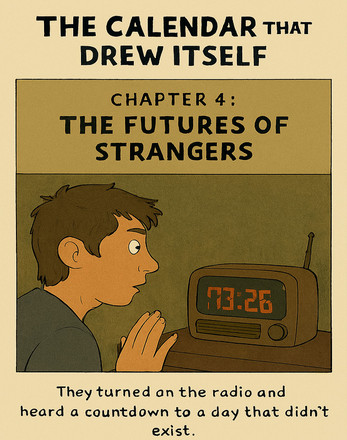
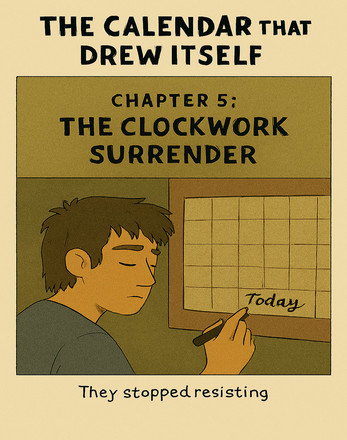
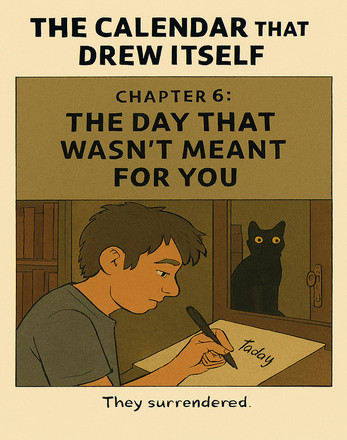
Leave a comment
Log in with itch.io to leave a comment.